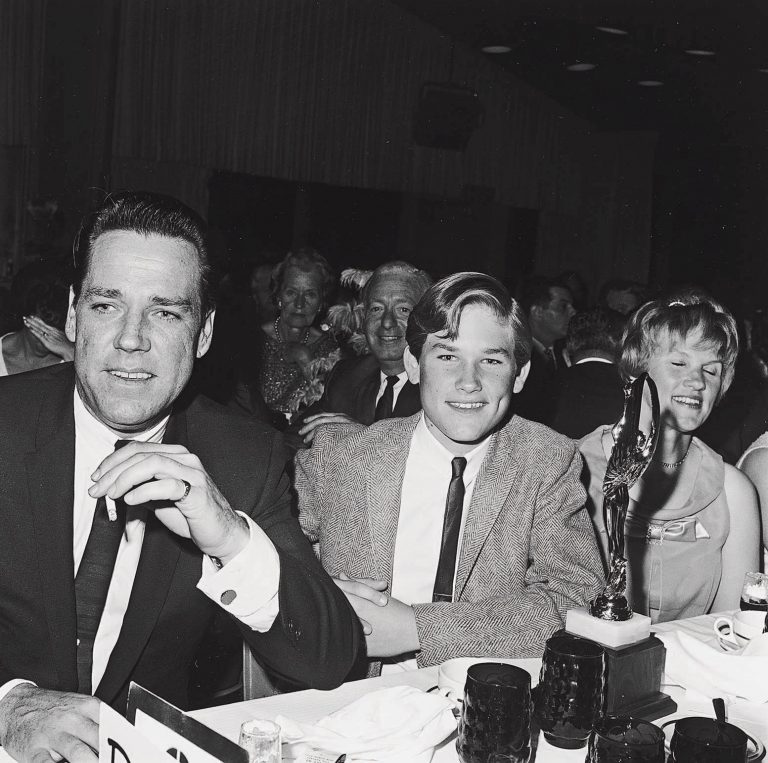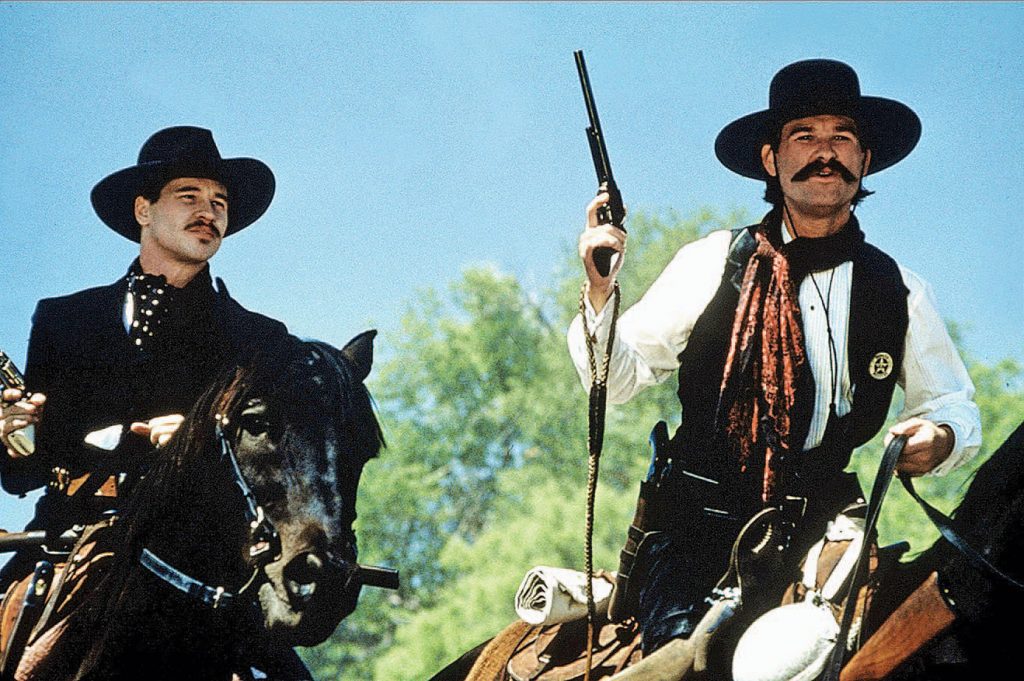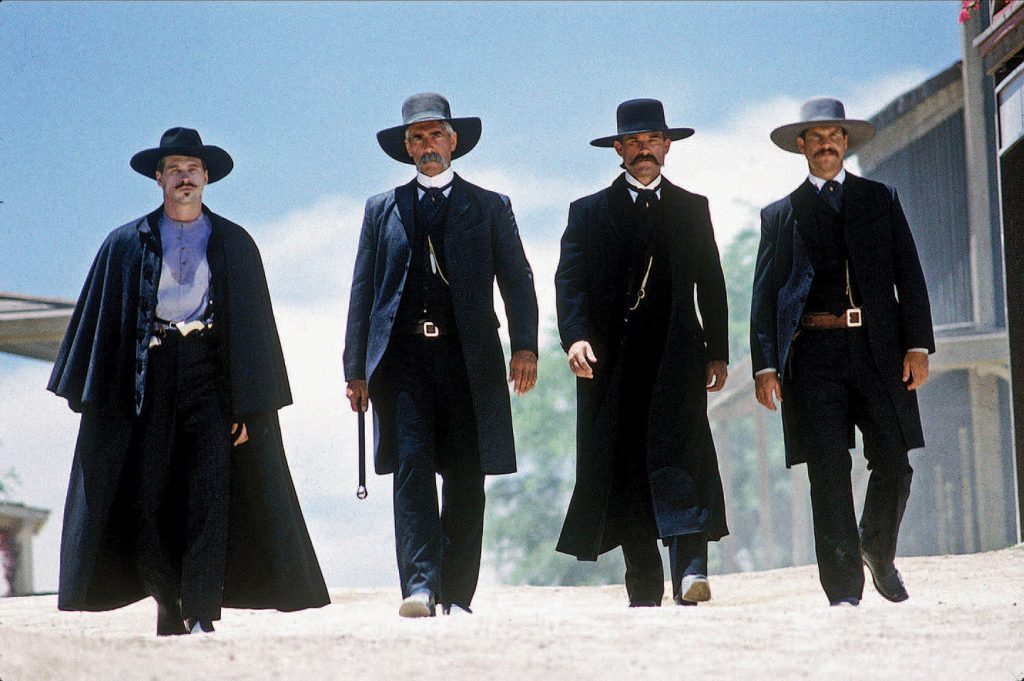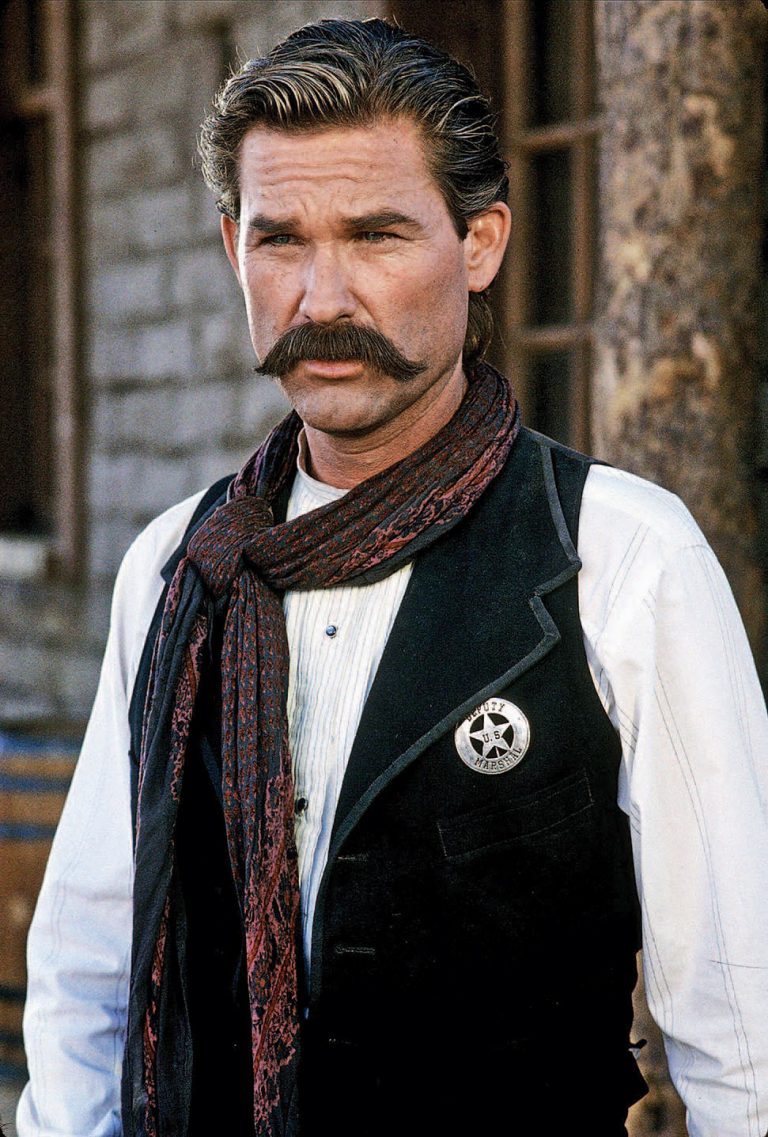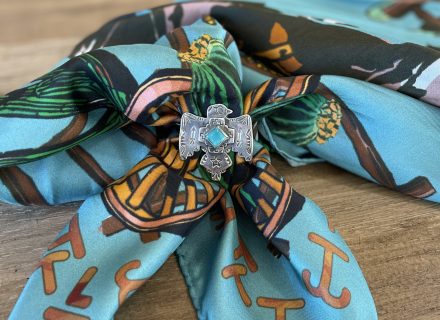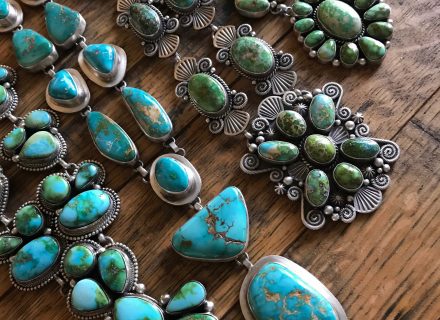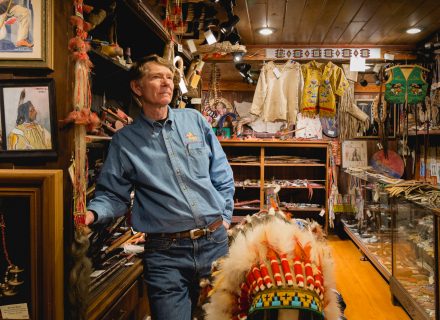As the acting legend and his late father are inducted into the Hall of Great Western Performers, he looks back on early roles and discusses the challenges behind the making of the 1993 classic Tombstone.
Make no mistake about it: Kurt Russell was pretty dadgum proud when he was notified by officials of the National Cowboy & Western Heritage Museum that he had been invited to be an inductee into the museum’s Hall of Great Western Performers. But he was even prouder that his late father, character actor Bing Russell, would be inducted alongside his son.
The elder Russell actually “starred” in a hugely entertaining 2014 documentary, The Battered Bastards of Baseball, which focused on his colorful 1973-77 career as the flamboyant manager of the aptly named Portland Mavericks, an independent Class A minor-league baseball team. But C&I readers likely know him better for his decades of supporting roles in innumerable TV and movie westerns, including The Magnificent Seven, Last Train from Gun Hill, The Horse Soldiers, Rio Bravo — he’s the fellow who gets shot by Claude Akins, thereby setting the plot into motion — and several episodes of Bonanza in which he played Deputy Clem Foster.
“My father once said he wanted to be in the Baseball Hall of Fame and win an Oscar,” Kurt told me during a recent interview. “And now he’s in the Hall of Great Western Performers. Which I think to him — well, it’s not an Academy Award, but it’s something that I think guys like him and me have maybe a deeper appreciation of, just because it means a lot. I’m very happy that’s happened for him. And I’ve left that hat of his from Bonanza, gave it to the museum, so there’ll always be a piece of him there.”
And Kurt? Decades before he earned his place in the pantheon of great western heroes with his commanding performance as Wyatt Earp in Tombstone (1993), he played the titular character — at the ripe young age of 12 — in The Travels of Jaimie McPheeters (1963-64), a primetime drama, based on Robert Lewis Taylor’s Pulitzer Prize-winning novel of the same name, about the westward journey of a doctor (Dan O’Herlihy) and his young son (Russell) as members of a wagon train. (Don’t worry: They managed to avoid almost all of the hardships that beset the pioneers in 1883.) He followed that with starring roles in two other short-lived TV westerns, The New Land (1974) and The Quest (1976), when he wasn’t concentrating on TV guest spots and feature films. One fine performance led to another, and he eventually established himself as an impressively prolific and versatile movie actor with two outstanding 2015 big-screen westerns on his résumé: Bone Tomahawk and The Hateful Eight.
We had the pleasure and privilege of speaking with Kurt Russell a few weeks before the scheduled Hall of Great Western Performers induction celebration. Here are some highlights from our conversation, edited for length and clarity.
Cowboys & Indians: Kurt, please correct me if I’m misremembering, but I vaguely recall you telling me years ago that your father had to play hardball as your contract negotiator when they tried to give Charles Bronson billing over you when he joined the cast at mid-season on The Travels of Jaimie McPheeters. 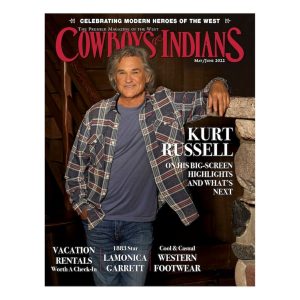
Kurt Russell: Well, no, my father didn’t become a negotiator at all. My father became a father who stood his ground for his son. And he said, “No, you can’t change the deal in mid-stride. The deal is the deal. This is what the billing is. And this is what it will be.” When he got wind of the fact that the billing wasn’t going to be what it was, we happened to be down in San Diego, seeing some friends all that weekend. And call me crazy, but it could have been the weekend that Kennedy was assassinated. Because I know we were down there in Coronado at that time when that happened. I don’t remember exactly what we were doing, but we watched, and the billing came on the show, whenever it was. What would that be? Something like the 14th show, because we did 26 in those days.
C&I: Right.
Russell: And the billing was wrong. My dad had been given good information that they were jerking around with my position on the show. So my dad just said, “Hey, we’re going to spend a couple more days down here, guys. We got no reason to go back. You don’t have to go back to work on Monday.” My dad was sticking to the contract — and MGM did not. They were going to break the contract. And it just happened to be Charlie Bronson was the actor who came in. And I don’t know what the issue was. But my dad said, “No, that’s not going to happen.”
And sure enough, about noon on the next work day, they were panicking and calling my agent — who happened to be my dad at the time, because I was only 12 years old. And my dad said, “This is real simple. You need to re-verify the contract as is, or Kurt won’t be coming to work ever again on that show.” And they said, “If you do this thing, we’re probably taking both you out of the business.” And my dad said, “Hey, that’s the way it is. This isn’t right.”
C&I: That was a pretty risky move.
Russell: Yeah, but it took about two hours for them to come back and say, “All right, all right, all right.” See, he wasn’t calling their bluff — he knew what he was doing, so he knew they couldn’t do what they were threatening. And that was who my dad was. He just said, “That’s wrong. That’s not happening. You can scream and holler and do whatever you want. But you guys are in the wrong and we’re not. And that’s the end of that.” And that was the end of that.
Bing Russell served as an advocate for his son, Kurt, in the latter’s early acting years.
C&I: OK, I have to ask — how did Charles Bronson respond to this?
Russell: I got along great with Charlie Bronson. I loved Charlie. He was great. He was the kind of guy that respected my dad’s straightforward honesty. Also, Charlie knew my dad, and I think Charlie told them, “Hey, I know Bing Russell. He’s not going to back down just because you guys have this in mind.” I never knew that much about it — to be honest with you, I’m speculating. But anyway, they did go back to the original deal and fix it.
C&I: The Travels of Jamie McPheeters is just one of your credits they considered when they recently inducted you — and your father — into the Hall of Great Western Performers. You’ve long been associated with westerns, because of other TV series like The Quest and The New Land, and movies like Bone Tomahawk and The Hateful Eight. And you could make the case that your 1998 sci-fi movie Soldier was Shane in outer space.
Russell: True.
C&I: And then there’s Tombstone, which is in a whole different class by itself. Looking back, do you remember there ever being a moment when you thought that much like a tennis player facing off against a worthy opponent, you really had to bring even more of your A-game than usual while playing Wyatt Earp against Val Kilmer’s flamboyant Doc Holliday?
Russell: I didn’t look at it that way at all. That never entered my mind. Tombstone’s a conversation in and of by itself. And I very rarely talk about Tombstone.
C&I: Well, whether there was any rivalry or not…
Russell: What I’m saying to you is I had a lot more on my mind than the idea — which I’ve never had in my mind — of trying to keep up with any actor. I don’t look at acting as something like that.
C&I: Actually, Val Kilmer has gone on record as citing you — praising you, really — as being single-handedly responsible for Tombstone being completed after screenwriter Kevin Jarre was fired as director early in the production.
Russell: Well, that was a situation where I had to cut 22 pages out of a script because the original writer didn’t, and we weren’t going to have enough money to finish the movie. And so I had to keep the trust of the actors that were involved. And I did that by eliminating five main scenes that I basically had done the movie for, but I felt like I had to cut if I could hold the thing together. I could get the movie made —and while it would not necessarily have the greatness of the original screenplay, it perhaps would have the impact that the screenplay would have had. And I think we succeeded in that regard. And I think that Val was great as Doc Holliday. And I think a lot of the other people in the movie were great at what they did as well.
Russell certainly faced his share of challenges during the making of Tombstone, but he was happy with the performances of his costars, including Val Kilmer, Sam Elliott, and Bill Paxton. “In my book, Tombstone might be as good as any Western ever written in terms of the dialogue.”
C&I: Why were you so intent on finishing Tombstone?
Russell: I just wanted to make sure that this thing got made because I thought it was such a great screenplay. And I wanted that for Kevin. But he was having his difficulties, for sure, directing it. And I knew that they were going to come down on him, and they had to replace him. And there was a whole thing there. I made an agreement to not talk publicly about certain things in terms of how the movie got made. I hold fast to that. But to me, there’s a bottom line, which is that it almost doesn’t matter how a movie gets made. It’s just that it does get made and that the best version of it gets made. And without a director leading the way, that’s a very difficult thing to happen. And so you have to find your leader, the leader has to get you through, and you have to have that support. And that eventually happened on Tombstone. It was a difficult film, but it’s a great western.
C&I: Any regrets?
Russell: [Pause.] I think that the screenplay was probably another 20 percent, maybe 20 percent better. But unfortunately, we were not able to do that because of what was spent in the first week of shooting. And they had their minds set — and I didn’t blame them on replacing Kevin Jarre. So that was done. And we got the movie made, and everybody did a great job by holding it together. And I think that all the actors worked extremely well together for the most part. It was a very difficult experience for me because I had gone out and gotten the money for the movie. That was the only time I ever did that. So I wanted to make sure I returned to the investor at least one dollar. And I did better than that.
C&I: Lots of people will endlessly debate over what was the best scene in Tombstone. But for me, it’s always been that farewell scene where Wyatt Earp visits the dying Doc Holliday in the sanitorium.
Russell: Yeah. That’s a good scene. But that was a scene that as originally written that didn’t quite work anymore because of some of the things we had to eliminate. So I had to take that scene and totally reconstruct it. We had a writer, a very nice guy, come in for a couple of weeks, helping and restructuring. We really knew where we had to go. But by the time we got to that scene, we were flying on our own while we’re trying to get the movie shot.
And so I had to rewrite it. And then Val and I would spend a lot of time in the car together sometimes, going home after a day’s work. There were a couple times when we got into the thing, and I’d run it past him, and we’d start kind of bouncing it back and forth. So I had Val’s involvement, too. And then basically, the last version had all these things in it. And Val and I knew each other so well at that point that he understood it completely. He liked what it was, and he liked what he could add to it and do with it. And I thought he was excellent. He was just great in that scene. He paid off the character. He paid off, I think, the whole movie.
C&I: It’s a fitting end for a relationship that is the backbone of the movie. Doc Holliday knows he doesn’t have many friends. Maybe no other friend than Wyatt Earp.
Russell: I always remember what Kevin Jarre wrote in the scene where they first run into each other in Tombstone. And Johnny Taylor, Billy Bob Thornton’s character, comes up with a shotgun.
C&I: And they treat him as no more than a minor annoyance, like a mosquito they can swat.
Russell: Yeah, and what does Val say? “Why Johnny! You madcap!” That’s one of the things I played in that scene — Wyatt was not even really paying too much attention, even after he’s seen this guy with a shotgun, and Doc’s called him out. You see that Doc is going to stop this activity, because he can see what might happens if it continues, whereas Wyatt Earp doesn’t really give the guy any notice. As Val and I used to say, “Wyatt’s still going to do what he’s going to do later in the movie — but a guy like that, he’s not a problem, and you’re not going to see Wyatt react much to it.”
I think that Val was great as Doc Holliday. And I think a lot of the other people in the movie were great at what they did as well. – Kurt Russell on Tombstone
Throughout the movie, those two react differently in different situations. And it’s fun to see when you watch that movie a number of times. You get to see a lot of stuff in between a lot of the different characters, but especially Doc and Wyatt, and you see the way they handle things differently, and you see how Wyatt Earp doesn’t treat Doc like anybody else. When he’s drunk and he’s dangerous, Wyatt tries to deal with it the best he can, but he can’t really do anything about that. Same thing with Wyatt Earp. When Wyatt Earp has his mind made up about something, nobody’s going to change it. Doc’s not going to change it. Nobody’s going to change it. You’re talking to this guy who is, as Val would refer to him, a concrete head. He was just set in his ways. So these things were fun. In my book, Tombstone might be as good as any Western ever written in terms of the dialogue.
C&I: Some of our readers would call it one of the best westerns ever made, period.
Russell: It’s just tough to beat in terms of entertainment — and in terms of accuracy, it turns out. And I do feel that the movie has a great impact as it continues to move up the list of best westerns as years go by. And I’m very proud of that one, there’s no question about it. There’s no reason not to be. That’s one entertaining movie. It’s like somebody put it to me. He wasn’t a professional critic, but he might be my favorite critic. He was comparing it to a few westerns that he’d seen when he said, “But when I seen Tombstone, I knew why them mother****ers must be famous.” And I said, “You got it. That was what I was trying to get out there.”
From our May/June 2022 issue
Photography by Robert Lynden









